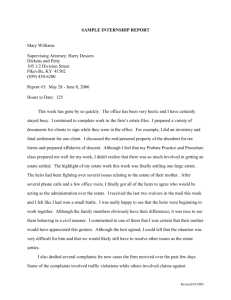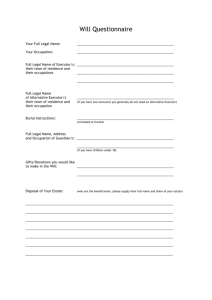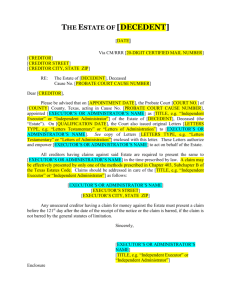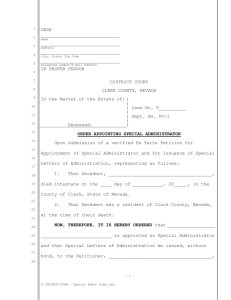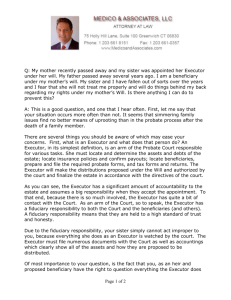Real Property in an Estate situation
advertisement
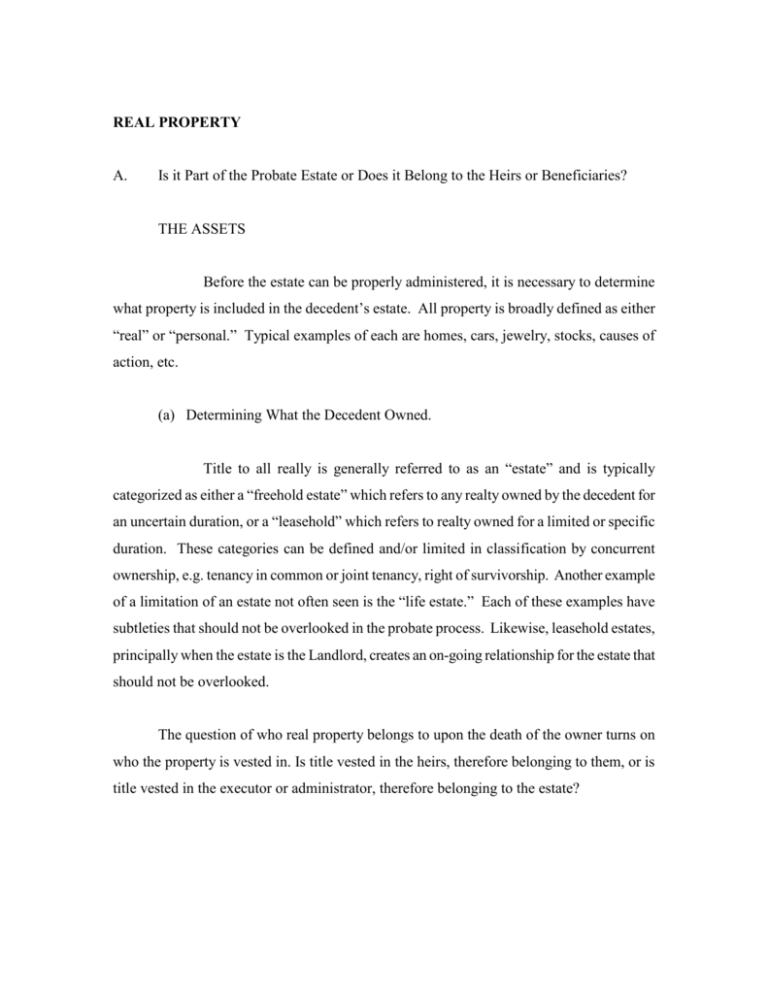
REAL PROPERTY A. Is it Part of the Probate Estate or Does it Belong to the Heirs or Beneficiaries? THE ASSETS Before the estate can be properly administered, it is necessary to determine what property is included in the decedent’s estate. All property is broadly defined as either “real” or “personal.” Typical examples of each are homes, cars, jewelry, stocks, causes of action, etc. (a) Determining What the Decedent Owned. Title to all really is generally referred to as an “estate” and is typically categorized as either a “freehold estate” which refers to any realty owned by the decedent for an uncertain duration, or a “leasehold” which refers to realty owned for a limited or specific duration. These categories can be defined and/or limited in classification by concurrent ownership, e.g. tenancy in common or joint tenancy, right of survivorship. Another example of a limitation of an estate not often seen is the “life estate.” Each of these examples have subtleties that should not be overlooked in the probate process. Likewise, leasehold estates, principally when the estate is the Landlord, creates an on-going relationship for the estate that should not be overlooked. The question of who real property belongs to upon the death of the owner turns on who the property is vested in. Is title vested in the heirs, therefore belonging to them, or is title vested in the executor or administrator, therefore belonging to the estate? Prior to the revision of the Probate Code in 1998, the interest in real property owned by the intestate decedent vested immediately upon death in his heirs at law. O.C.G.A. §53-48. However, the rights of the heirs in the property is subject to the rights of an administrator to distribute the property. Williams v. Williams, 259 Ga. App. 888 (2003). Therefore, while the title to the property vests in the heirs, it is subject to divest upon a proper showing by the administrator that the property is necessary for the administration of the estate. Wilcox v. Thomas, 191 Ga. 319 (1940). This was not altered by the revisions and subsequent to the revisions of the Probate Code, the title to real property owned by an intestate decedent vests immediately in his heirs at law. O.C.G.A. §53-2-7(a). However, upon appointment of an administrator, title in the heirs is divested and vests with the administrator for the benefit of the decedent’s heirs and creditors. O.C.G.A. §53-2-7(c). Title does not revest in the heirs until the administrator assents to such revesting. O.C.G.A. §53-2-7(c). If an order of no administration necessary is entered, title vests at that time in the heirs according to their agreement, and relates back to the time of death. O.C.G.A. § 53-2-7(c). Prior to the revision of the Probate Code in 1998, under O.C.G.A. § 53-2-7(b), if no administrator was appointed within five years of the death of the intestate, title vested in the heirs and related back to the time of death. This section was amended, by the 1998 revisions, by changing the five year limit to a three year limit. This section was again amended in 2000 and the provision regarding a time limit was removed altogether. Therefore in a situation in which no administrator has been appointed, title vests in the heirs upon death of the intestate. However, their title is subject to divestment if a creditor or other interested party is appointed administrator. Therefore the real property of an intestate belongs to the heirs until appointment of an administrator, and remains with the administrator until he assents to title passing back to the heirs. The title to real property passing under a will follows a similar path to that of descent by law. Prior to the revision of the Probate Code in 1998, the title to real property owned by a testate decedent passed to his executor until a determination as to debts and distribution has been made. O.C.G.A. §53-2-108. The title of the beneficiary is inchoate and is not perfected until the executor has assented to the devise. See Oliver v. Irvin, 219 Ga. 647 (1964). Once the executor has assented to the devise, the title of the beneficiary will relate back to the date of the decedent’s death. O.C.G.A. §53-4-2. The status of a beneficiary’s title was not altered by the revisions to the probate code. B. The Insolvent Estate: How to Recover the Realty to Satisfy its Creditors. The question of how to recover real estate from an insolvent estate presupposes that either the estate once had real estate that was devised to heirs or beneficiaries or that property that should have been administered by the estate was conveyed outside of probate. In either case it can also be assumed that notice was not given to the creditor. The creditor may seek a pro rata contribution from the heirs if the estate distributes property without notice of an existing debt. O.C.G.A. § 53-7-43. However, this does not necessarily mean that the creditor will be able to reach the property. If the heirs themselves have become insolvent, the creditor does not have remedy. Yerby v. Matthews, 26 Ga. 549 (1858). As to the property itself, it is well settled in Georgia that, “An unpaid creditor may follow the land into the hands of the devisees and subject it at law or equity to the payment of his claim.” McNair v. Rabun, 159 Ga. 401 (1924 ), Wilson v. Aldenderfer, 183 Ga 760 (1937), Trustees of Jesse Parker Williams Hospital v. Nisbet, 191 Ga 821 (1941), Biggers v. Gladin, 204 Ga 481, (1948). The creditor may do this in two ways. The creditor can bring suit directly against the heir. Crockett v. Mitchell, 88 Ga. 166 (1891). This may be done even if the heir is also the executor or administrator. Id. Alternatively, the creditor may seek to establish an implied trust on the property. O.C.G.A. § 53-12-192(b) C. When the Heirs or Beneficiaries are Minors Who Cannot Pay the Mortgage. Generally it is the duty of the administrator or executor to pay the debts of the estate prior to a devise of property. O.C.G.A. §53-4-63. It would seem that this would include deeds to secure debt and mortgages thereby preventing the occurrence of situations in which minors are unable to pay mortgages. However, the executor does not have a right to refuse assent due to an outstanding security deed and the devisee will take subject the encumbrance if the devisee consents. See Dixon v. Richardson, 194 Ga. 443 (1942). If the devise is specific the devisee of the encumbered property bears the burden of paying the indebtedness, and cannot look to the sale of other property, specifically devised to another, to pay for the indebtedness. Raines v. Shipley, 197 Ga. 448 (1944). It is the duty of the appointed guardian to make a determination of whether or not the minor heirs or beneficiaries will be able to make the payments. If it is determined that they would not be able to do so, then the guardian may refuse the assent unless the deed to secure debt or mortgage is paid off with other funds from the estate. If this is not possible then the administrator or executor should sell the property and distribute the proceeds to the minor heirs or beneficiaries, or in the alternative devise the property, and then the guardian should petition for leave to sell the property. If the property is devised to the heirs or beneficiaries under the mistaken belief that they will be able to make the payments, then it is the duty of their guardian to dispose of the property and hold the proceeds for the minor heirs of beneficiaries. The property cannot be protected from the holder of the security deed simply because the heirs or beneficiaries are minors. Devising the property to the minor heirs through Year’s Support will not protect the property from a the holder of purchase money security deed. See House v. House, 191 Ga. 678 (1941). D. Eviction of Children Living in the Parents Home. In the event that the deceased parent’s home is sold, by foreclosure or otherwise, or is held under a lease that has terminated, the children living in the home will be subject to eviction. However, to reach this point, there must be no other available avenues to avoid eviction. It is the duty of the administrator or executor to manage the estate to the best advantage of the heirs thereto. Bloodworth v. Bloodworth, 260 Ga. App. 466 (2003). Therefore, the administrator or executor must do all that is possible to avoid this situation. However, the situation may be such that the children are not beneficiaries and the executor has no obligation to look out for their interests. If the children are heirs or beneficiaries and gain title through administration of the estate, only to loose the home to foreclosure, then they are treated as tenants at sufferance, and as such may be evicted by a dispossessory proceeding. Ray v. Holden, 62 Ga. App. 554 (1940). The children cannot challenge the validity of the foreclosure as a defense to the dispossessory. Solomon v. Northwest Mortgage Corp., 245 Ga. App. 875 (2000). Children who are not beneficiaries, but are in wrongful possession are also tenants at sufferance. Thrift v. Schurr, 52 Ga. App. 314 (1935). They may be evicted by dispossessory proceeding brought by the executor.
